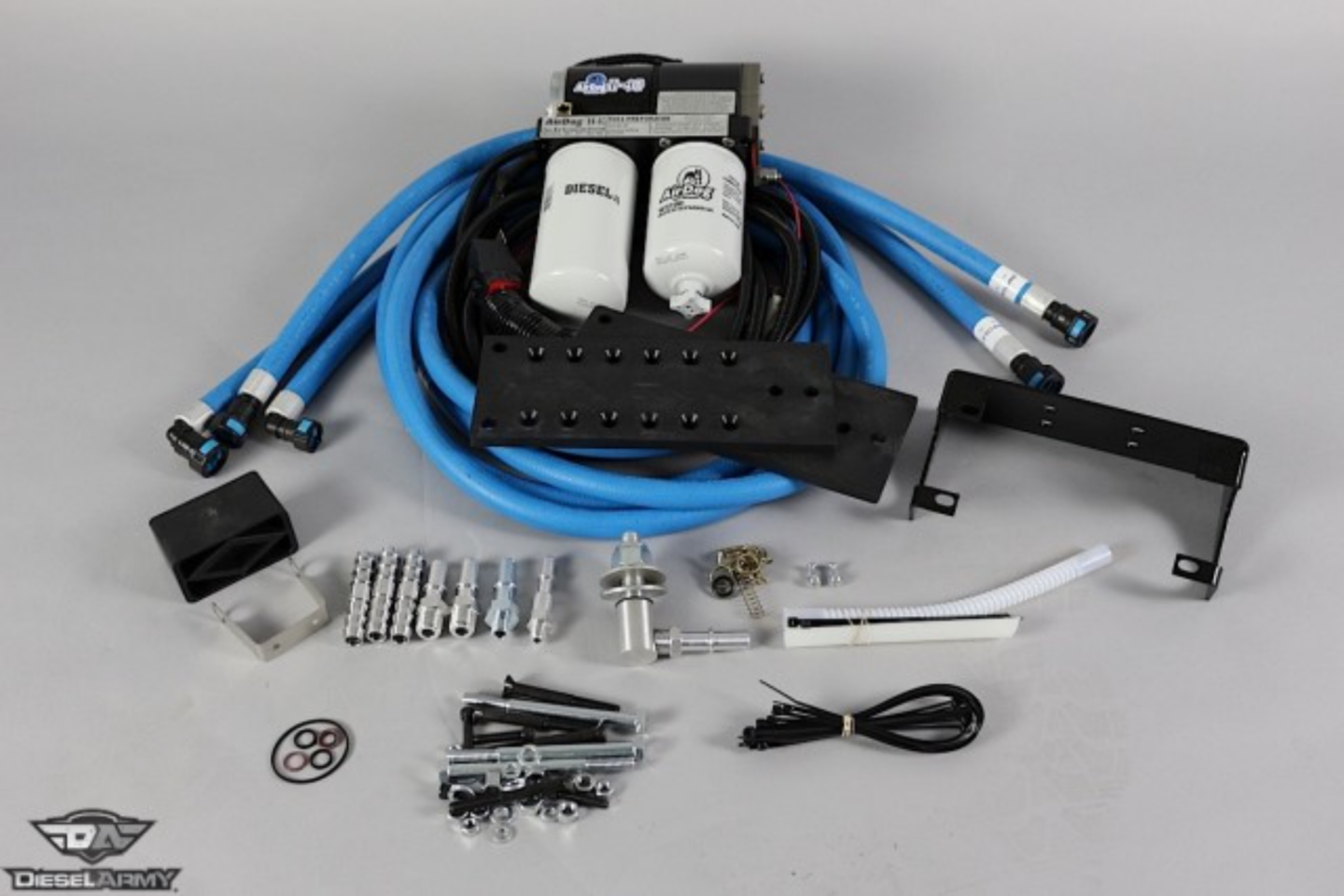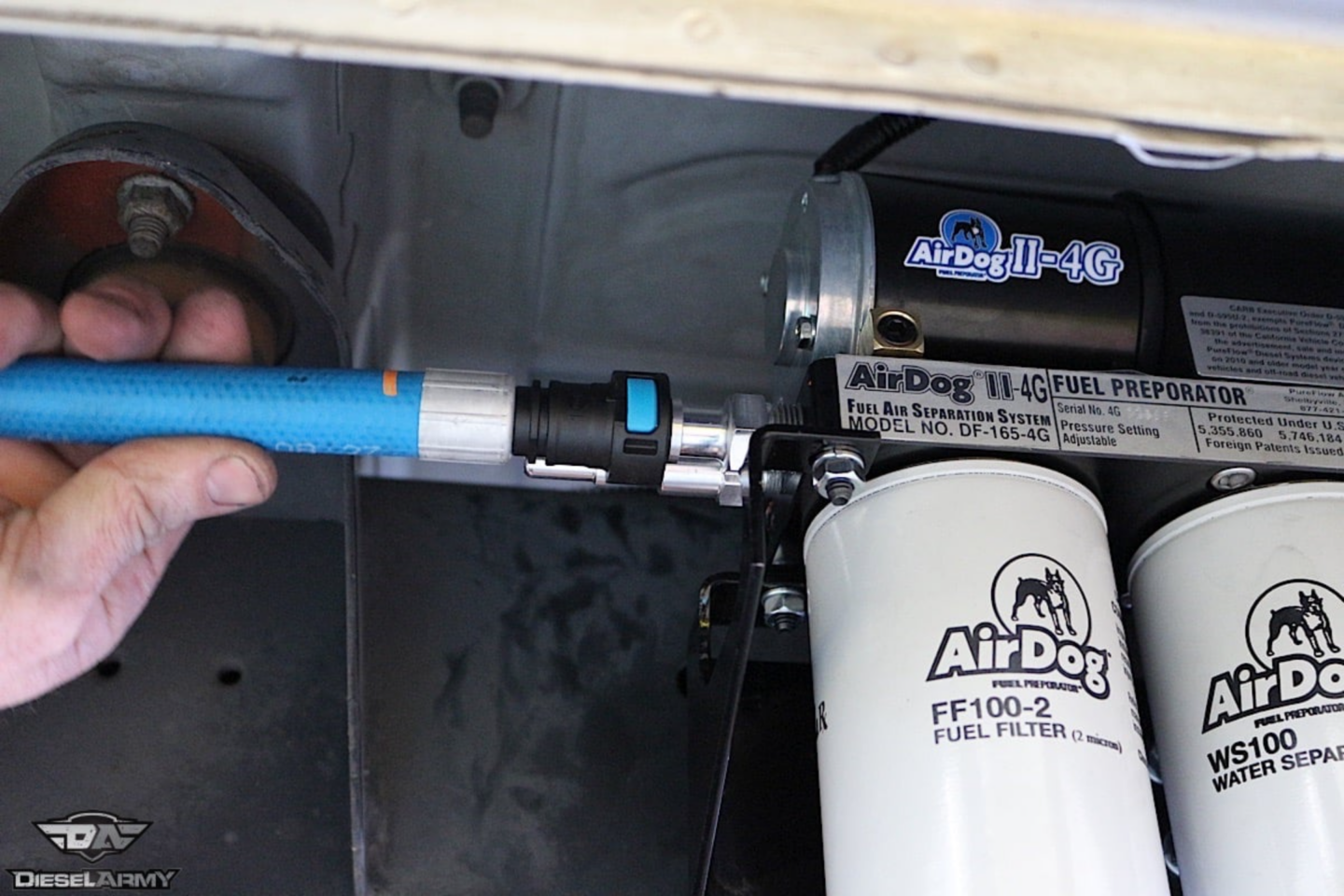One of the questions we get frequently asked is about the need for an aftermarket lift pump. Many Diesel Army readers want to know if their truck needs one. The answer is not an easy one, as the necessity of an upgraded lift pump is contingent upon various factors. Although not universally mandatory, in specific situations, it is highly advisable. Depending on what your modifications are under the hood, an upgraded fuel lift pump may be for you. We reached out to the fuel-delivery experts at Pure Flow Air Dog to get some insight about when an upgraded lift pump might be necessary. Here are seven scenarios when a lift pump proves necessary or markedly beneficial for you.
Aftermarket Lift Pump Benefits
High-Performance Modifications: When diesel pickup owners pursue high-performance modifications, such as heightened horsepower via upgraded injectors or turbochargers, the demand for fuel delivery escalates. An aftermarket lift pump becomes indispensable to maintain a consistent and ample fuel supply, meeting the augmented performance requirements. When the injectors and high-pressure pumps aren’t supplied with enough fuel, available horsepower and torque are diminished.
Preventing Fuel Starvation: In instances of aggressive acceleration, braking, or cornering, diesel fuel in the tank undergoes sloshing. This can cause aeration of the fuel system. Air bubbles in diesel fuel can cause problems in two main ways. First, they reduce fuel efficiency. This means when you burn this air and fuel mixture, it doesn’t burn as efficiently. This leads to lower fuel efficiency and less power. Also, air in the fuel makes pockets of vapor that collapse and damage important parts like fuel injectors, a process known as cavitation.

Packaged nicely with a pump, fuel filter, and water separator, a lift pump is a small investment that will save you thousands if you find contaminated fuel.
Injector Longevity: Although not often considered for its ability to keep injectors happy, an aftermarket lift pump can play a pivotal role in preserving the lifespan of fuel injectors. By ensuring a continuous flow of clean and pressurized fuel, a high-performance lift pump helps prevent premature wear and failure of injectors, particularly in situations where inadequate fuel pressure could compromise an adequate supply of fuel. If your injectors are not getting the fuel needed to operate efficiently, they can become damaged beyond repair.
Air And Water Separation: Equipped with air and water separation capabilities, lift pumps assist in eliminating entrapped air and water from diesel fuel. Water in diesel fuel is dangerous as water does not compress. Get water in your injectors and ultimately your engine’s cylinders and serious damage will be the result. This is critical for averting issues like injector timing delays and corrosion within fuel system components, mitigating the risk of expensive repairs.
Increased Fuel System Efficiency: A lift pump contributes to heightened fuel system efficiency in diesel pickups. Consistent fuel pressure ensures optimal combustion, thereby improving power delivery, fuel economy, and reducing exhaust emissions. A diesel lift pump is like a fuel delivery superhero for diesel engines. Even though it doesn’t directly make your engine more powerful, it does make sure your engine gets a steady and reliable supply of fuel.
While a high-performance lift pump might not directly be the star that makes your engine more powerful, it’s a key player in keeping things running smoothly and reliably, making sure your engine stays in top shape.
Towing And Heavy Loads: When towing heavy loads or engaging in activities requiring increased engine power, an aftermarket lift pump becomes advantageous to meet heightened fuel requirements. This ensures performance continuity and prevents fuel-related issues, especially in scenarios where the stock fuel system may struggle to keep pace.

Complete kits are available for virtually every truck. Mounting, wiring, and plumbing are all included and ready for installation.
In summation, a lift pump is frequently considered necessary for diesel pickups undergoing performance enhancements. It contributes to enhancing fuel delivery, injector longevity, and overall system health, making it a valuable augmentation for diesel enthusiasts seeking heightened performance and reliability.
Speaking To The Experts
As mentioned, the sloshing of fuel in the fuel tank will cause it to aerate. The detrimental impact of air and water will cause insufficient lubrication, leading to premature failure of injection components. By implementing AirDog’s aftermarket lift pump, these issues are mitigated, ensuring clean fuel is delivered, effectively lubricating the high-pressure fuel system and eliminating disruptions in spray patterns.
If you have been wondering whether an aftermarket lift pump is needed for your truck, to align with the diverse needs of diesel enthusiasts, AirDog provides different flow ratings – 100, 150, 165, and 220 gallons per hour (GPH). These ratings are correlated with specific horsepower goals, providing a tailored solution for different performance levels:
- 100 GPH Pump – Stock to 500 horsepower
- 150, 165 GPH Pump – Stock to 700 horsepower
- 220 GPH Pump – 600-1,000 horsepower

Newer OE-designed fuel systems incorporate push-lock fittings, making connections and disconnections an easy job.
While these measurements are conservatively generalized across Duramax, Cummins, and Power Stroke fuel systems, AirDog acknowledges the importance of understanding the truck’s fuel system specifications and building a platform for a more precise recommendation. Typically, trucks with moderately larger injectors opt for the 150 and 165 GPH pumps, while stock configurations with stock injectors lean towards the 100 GPH pump. The 220 GPH pumps find their place in trucks with extremely large injectors, exemplified by notable horsepower achievements.
As the conversation unfolds, it becomes evident that the decision to incorporate an aftermarket lift pump, like an AirDog system, is not confined to a specific performance bracket. Whether running at stock levels or pushing the boundaries of modification, lift pumps stand ready to be a reliable upgrade to safeguard the fuel system’s health and optimize diesel performance. If you are interested in learning what it takes to install an aftermarket lift pump, you can check out an install we previously tackled on a Ram truck some time ago. While this install also incorporates a new external sump install, the installation of the lift pump is still relevant.
For more information on lift pump systems, head over to the PureFlow AirDog website.




